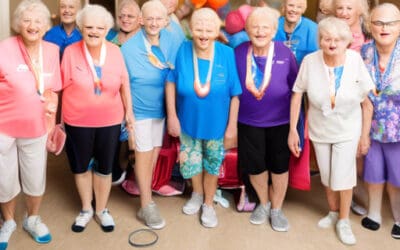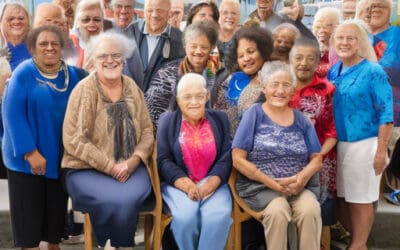Navigating the landscape of senior living can often feel like venturing into a new world filled with unfamiliar terminology. Understanding this terminology is crucial for making informed decisions whether you are exploring retirement planning, looking into memory care options, or considering a move to a nursing home or an assisted living community for yourself or a loved one. From legal and financial terms to healthcare and living arrangements, there’s a lot to digest. In this blog post, we delve into 50 of the most important terms you should familiarize yourself with on this journey. These terms will provide a clearer understanding and make the transition into this phase of life smoother and less daunting. So, let’s embark on this educational journey together, shedding light on the lexicon of senior living.
| Activities of Daily Living (ADLs) | Basic self-care tasks such as eating, bathing, and dressing. |
| Adult Day Care | A service for older adults that provides social, recreational, and health services during daytime hours. |
| Adult Protective Services (APS) | A social service program provided by states, aimed at assisting older adults and adults with disabilities who are in need of aid. |
| Advanced Directive | Legal documents that allow individuals to convey their decisions about end-of-life care ahead of time. |
| Aging in Place | The ability to live in one’s own home and community safely, independently, and comfortably, regardless of age, income, or ability level. |
| Alzheimer’s | A type of dementia that causes problems with memory, thinking, and behavior. |
| Annuity | A financial product that provides a steady income stream, often used as part of a retirement strategy. |
| Assisted Living | A living arrangement for seniors who require some assistance with daily activities but wish to remain as independent as possible. |
| Assisted Living Facility (ALF) | A housing facility for people with disabilities or for adults who cannot or choose not to live independently. |
| Beneficiary | A person who is eligible to receive distributions from a will, trust, retirement account, or other contract. |
| Care Plan | A detailed plan for meeting a resident’s physical, medical, social, and mental needs in a long-term care setting. |
| Caregiver | An individual who provides care to someone who needs assistance with daily tasks. |
| Certified Geriatric Pharmacist (CGP) | A pharmacist who has proven competency in geriatric pharmacotherapy by passing a comprehensive examination. |
| Certified Nursing Assistant (CNA) | A person certified to assist nurses in providing basic care to patients. |
| Congregate Housing | Housing facilities that provide a shared living environment and are designed to integrate the housing and services needs of older individuals. |
| Conservatorship | A legal concept where a guardian or a protector is appointed to manage the financial affairs and/or daily life of another due to physical or mental limitations. |
| Continuing Care Retirement Community (CCRC) | A retirement community that offers a range of services from independent living to nursing home care, allowing seniors to stay in the same community as their needs change over time. |
| Custodial Care | Non-medical care that helps individuals with their daily basic care, such as eating and bathing. |
| Dementia | A general term for a decline in mental ability severe enough to interfere with daily life. |
| Elder Law | A field of law that deals with the legal issues affecting elderly individuals. |
| Estate | The total property, real and personal, owned by an individual prior to distribution through a trust or will. |
| Estate Planning | The act of preparing for the transfer of a person’s wealth and assets after their death. |
| Geriatric Assessment | A multidimensional evaluation designed to assess the medical conditions, mental health, functional ability, and social circumstances of older adults. |
| Geriatric Care Manager | A professional who helps seniors and their families manage senior care and transitions. |
| Geriatrician | A medical doctor who specializes in the diagnosis, treatment, and prevention of diseases and disabilities in older adults. |
| Gerontology | The scientific study of old age, the process of aging, and the particular problems of old people. |
| Home Health Care | Medical or non-medical care provided in a home setting. |
| Hospice Care | Care designed to give supportive care to people in the final phase of a terminal illness and focus on comfort and quality of life, rather than cure. |
| In-Home Care | Services that allow a person with special needs to stay at home while receiving care. |
| Independent Living | A living arrangement for seniors that requires little to no assistance with daily activities. |
| Individual Retirement Account (IRA) | A tax-advantaged account that individuals use to save and invest for retirement. |
| Life Estate | A legal arrangement whereby an individual is allowed to live in a property for the rest of their life, but does not own the property. |
| Life Settlement | The sale of an existing life insurance policy to a third party for more than its cash surrender value but less than its net death benefit. |
| Living Will | A written document that specifies what types of medical treatment are desired should the individual become incapacitated. |
| Long-term Care Facility | A facility that provides a variety of services, both medical and personal care, to individuals who are unable to manage independently in the community. |
| Long-term Care Insurance | Insurance coverage that pays for long-term care services and supports, including personal and custodial care in a variety of settings. |
| Medicaid | A joint federal and state program that helps with medical costs for some people with limited income and resources. |
| Medicare | A federal health insurance program for people who are 65 or older, certain younger people with disabilities, and people with End-Stage Renal Disease. |
| Memory Care Facility | A facility that provides specialized care and a secure environment for individuals with Alzheimer’s or other dementias. |
| Occupational Therapy | Therapy that helps individuals achieve independence in all facets of their lives despite disabilities or impairments. |
| Palliative Care | Specialized medical care for people with serious illnesses, focusing on providing relief from symptoms, pain, and stress. |
| Power of Attorney (POA) | A legal document giving one individual the authority to act for another individual in specified or all legal or financial matters. |
| Respite Care | Temporary care provided in a nursing home or other facility, allowing a regular caregiver to take a break. |
| Retirement Community | A residential community or housing complex designed for older adults who are generally able to care for themselves. |
| Reverse Mortgage | A loan available to homeowners 62 and older that allows them to convert part of the equity in their home into cash. |
| Senior Centers | Community facilities where older adults can gather for social, educational, and recreational activities. |
| Skilled Nursing Facility (SNF) | A type of nursing home that provides medical care, rehabilitation, and other health services for individuals with serious medical conditions. |
| Social Security | A federal program that provides financial support to retirees or disabled individuals based on their earnings record. |
| Trust | A fiduciary relationship in which one party, known as a trustor, gives another party, the trustee, the right to hold title to property or assets for the benefit of a third party. |
| Will | A legal document in which a person specifies the method to be applied in the management and distribution of their estate after their death. |
As we navigated through 50 pivotal terms in the realm of senior living, the importance of understanding this lexicon becomes evidently clear. The journey through retirement and beyond is laden with decisions that significantly impact the quality of life. Being well-versed in the terminology not only empowers you to make well-informed decisions but also eases the transition into different living arrangements or care options. Whether it’s deciphering the nuances of financial planning or understanding the spectrum of care services available, each term unraveled adds a layer of clarity to the complex tapestry of senior living. As you continue exploring, remember that knowledge is the compass that guides you through the myriad choices and challenges that lie ahead.



